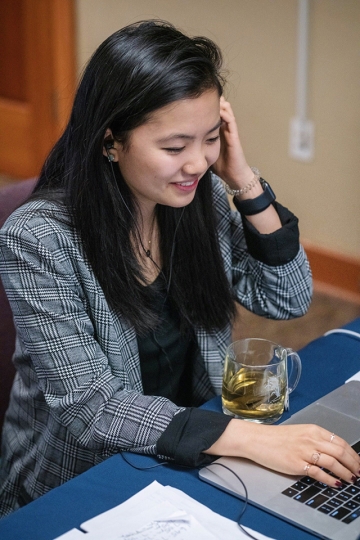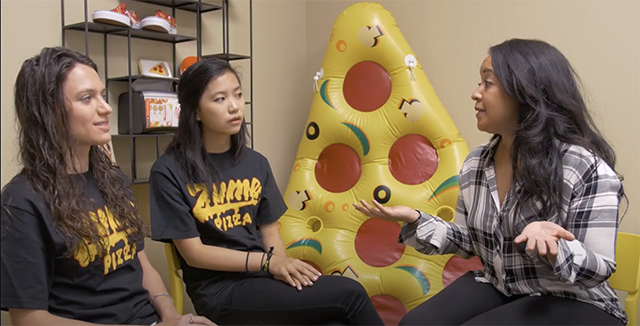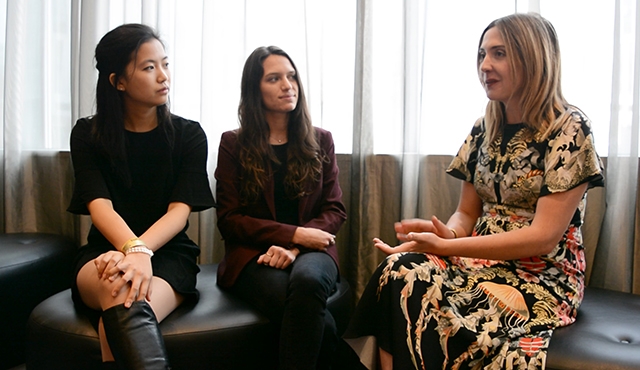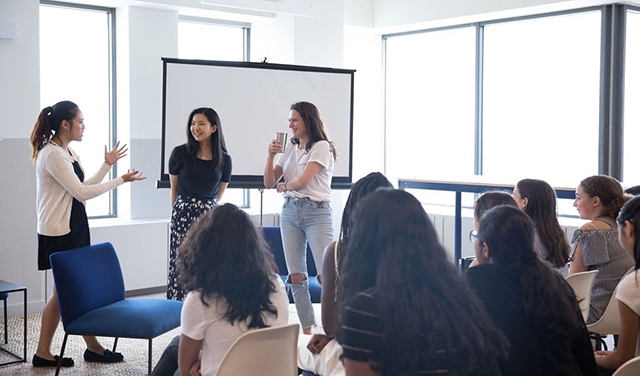As co-host of a new podcast, Techsetters, by Kode With Klossy, Wang interviews leaders in the world of tech, drilling down on the defining moments in their careers and the unconventional paths they followed. (Photo provided by Jenny Wang)
Jenny Wang has never been afraid to ask questions.
So she feels right at home as the co-host of a new podcast, Techsetters, by Kode With Klossy, that features a series of interviews with leaders in the world of tech, drilling down on the defining moments in their careers and the unconventional paths they followed.
“We wanted to share the stories of these leaders in technology with nontraditional backgrounds and interview them through the lens of two young women,” said Wang, A.B. ’19, a computer science concentrator at the Harvard John A. Paulson School of Engineering and Applied Sciences. “My co-host, Sam, and I are just starting out in our careers. We don’t know where we’ll be in 10 years, but we want to show our listeners that becoming a leader in technology is not a pipe dream, and shatter the mental models of what is possible. We want to show different ways people are using their own nontraditional backgrounds to solve problems they are passionate about.”
Wang’s interest in problem solving is what drew her to computer science in the first place. While in high school, she jumped at the opportunity to spend a summer at the Harvard Medical School working on a computational neuroscience research project. That opened her eyes to the ways computer science could have huge positive impact on people’s lives.
The following spring, the high school senior presented that research at a tech conference, where she met the chairman of Carbon, who invited her to intern at his startup that summer. That experience introduced Wang to an entrepreneurial world that quickly captured her attention.
It also inspired her to study computer science at Harvard so she could follow in the footsteps of the legendary founders who have had such an impact on the future of technology.
“I was really interested in computer science, but I also felt a lot of imposter syndrome,” she said. “I had done really well in high school, but coming to Harvard, all of a sudden I was in a much bigger pond. Being surrounded by all these brilliant peers, it seemed like they started programming out of the womb. How could I ever catch up? Am I legit enough? Am I smart enough?”
Wang found support and encouragement through student organizations, like Harvard Women in Computer Science and Rough Draft Ventures, a venture capital organization where students are empowered to invest in other student founders.
She became the Harvard student Partner at Rough Draft Ventures, where she was introduced to Samantha Wiener, who had the same role at Columbia University. The two met in person that summer while they were both interning in Silicon Valley.
Over coffee, they shared similar stories—both grew up on the East Coast and had no idea what Silicon Valley was all about; both loved meeting role models and hearing their stories; both had felt imposter syndrome; and both wanted to encourage others to pursue STEM, even in the face of uncertainty or adversity.
Wang and Wiener interview Zume Pizza co-founder Julia Collins (Photo provided by Jenny Wang)
“We wanted to create a platform to share stories, but we didn’t know yet what it would be,” Wang said. “When you Google top leaders in tech, you find the common culprits – the Elon Musks and the Jack Dorseys of the world, who are all amazing, but you never get to hear the stories of all these other underrepresented innovators who are doing really cool things because their voices are just not amplified enough. So we thought, why don’t we go do that?”
They started a Youtube channel and began interviewing founders around Silicon Valley. Their first interview was with Zume Pizza co-founder Julia Collins (who they cold-emailed) while the company was still in stealth mode. They conducted an on-air taste-test of the robot-produced pizza; little more than a year later, the startup was valued at over $2 billion.
From there, they interviewed a group of female founders at the Forbes Conference in Boston in 2017, and then interviewed more tech leaders at the Y Combinator’s Female Founders Conference the following year.
“We actually rented a camera and 3D printed a microphone to pass off as press,” Wang recalled. “So they let us go backstage and we interviewed a bunch of amazing speakers.”
Wang and Wiener interview former TechCrunch Editor in Chief Alexia Bonastos. (Photo provided by Jenny Wang)
At the same time, the friends discovered Kode With Klossy, a program that offers free coding camp for girls between the ages of 13 through 18, launched by super model and entrepreneur Karlie Kloss.
“It was inspiring to see someone who was so successful in her own realm learning to code and wanting to shine a light on encouraging more women to pursue engineering,” Wang said.
It was an initiative they wanted to be a part of. Perhaps a bit impulsively, Wiener reached out on Instagram, although they never expected to hear back, Wang recalled.
But they did. The Kode with Klossy team had noticed the friends’ Youtube videos, and they began talking about producing a podcast last April. Soon, Techsetters was born.
So far, they’ve conducted interviews with a number of accomplished guests, like Cady Coleman, a retired NASA astronaut who logged more than 180 days in space. In addition to discussing her career and solving complex robotics problems, Coleman shares fun stories about how she helped Sandra Bullock train for the movie “Gravity.”
Wang and Wiener speak at Kode With Klossy's New York City camp in August, 2019. (Photo provided by Jenny Wang)
Another guest the pair had fun interviewing was Joy Buolamwini, a Research Assistant in the MIT Media Lab and founder of the Algorithmic Justice League, which seeks to fight bias in decision making software and create a world with more ethical technology. Buolamwini has uncovered racial biases in facial recognition software used by leading tech companies and her film, “Coded Bias,” was featured at the Sundance Film Festival.
“We’ve learned so much from interviewing our guests,” Wang said. “I’m really hopeful that through this community of people that we’ve brought together, we can go even further. Sam and I owe so much to our mentors and we wouldn’t have had half the experiences we’ve had if it hadn’t been for these people who showed us the ropes and paid it forward. We hope that these stories are able to show other young women what they can do with code.”
Wang has drawn on advice from mentors in each step of her career. In 2018, she co-founded re—inc with four members of the U.S. women’s soccer team; the seed-stage startup is a direct-to-consumer streetwear brand that also has ambitions to become a digital platform and social movement.
But the company’s mission is about much more than selling products—at its core is a fervent focus on championing equity and challenging outdated beliefs. That focus frames how Wang views the change that is needed in the tech world, and informs her work on Techsetters.
Since January, Wang has also served as an investor at Neo, a mentorship community and seed-stage venture capital fund founded by Harvard computer science alumnus Ali Partovi, A.B. ’94.
She and Wiener end every Techsetters interview by asking for the guest’s best actionable advice to their younger self. For Wang, that advice boils down to two things: challenge yourself and don’t be afraid to ask questions.
“It is OK to not understand everything or feel like you are out of your depth. It is really tempting to feel that way and run the other direction,” she said. “Feeling like you don’t belong or you’re not good enough to study computer science is definitely something that I faced, but I think it also gives you an edge. The more that you know you don’t know, the more motivated you are to actually solve problems.”
Press Contact
Adam Zewe | 617-496-5878 | azewe@seas.harvard.edu



